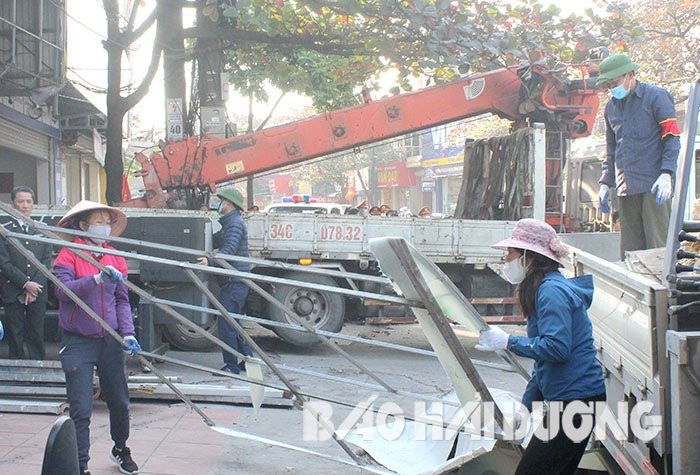Civil enforcement is a complicated task because it directly affects the property and personal rights of the parties and related persons.

During the execution of judgments, officers and enforcement officers repeatedly face uncooperative behavior from judgment debtors.
From threats to plant mines and burn houses
In mid-September, we had the opportunity to join the working group of the Civil Judgment Enforcement Department of Hai Duong province to direct an enforcement session related to a divorce dispute and division of common property in Van Hoi commune (Ninh Giang). Before carrying out the enforcement, the enforcement agency assessed that although the case was not complicated, it was still necessary to prepare full backup plans to ensure success. During the enforcement process, the person subject to enforcement and his relatives continuously used uncooperative words and attitudes, used mobile phones to broadcast live on social networks... to put pressure on the task force. Using professional measures, the enforcement force successfully organized the enforcement of the case, ensuring the strictness of the law.
In December 2022, the Civil Judgment Enforcement Department of Hai Duong province organized an enforcement at house number 195 Le Thanh Nghi Street (Hai Duong City). This is a very complicated case. The enforcement process lasted nearly 4 years because the judgment debtor continuously resisted. According to the commercial judgments, Ms. Vu Thi L., owner of Phuc Lien Private Commercial Enterprise, located at number 195 Le Thanh Nghi Street (Hai Duong City), is responsible for paying the principal and interest to the Vietnam Joint Stock Commercial Bank for Industry and Trade with a total amount of more than 50 billion VND. However, Ms. L. said that the land area according to the mortgage records was not consistent with reality, leading to errors in the judgment, and filed a complaint with the General Department of Civil Judgment Enforcement. Although the enforcement officers of the enforcement agency came many times to explain, persuade, and create conditions for the judgment debtor to meet with bank representatives, there were no results. To recover the debt at the request of the bank, the provincial Civil Judgment Enforcement Department organized the compulsory seizure of mortgaged assets, which are land use rights and assets attached to the land, and then conducted appraisal and auction. The assets subject to compulsory seizure are large factories with a large volume of furniture, so the relocation takes a lot of time and effort.
Mr. Nguyen Van Quy, Head of the Civil Judgment Enforcement Office of Hai Duong City, said that because of conflicts in civil relationships, many enforcement cases are very complicated, such as land disputes, property disputes after divorce, bank debts, etc. Many parties, although having the conditions to enforce the judgment, still deliberately delay and do not voluntarily enforce. There are cases where they do not hand over the property but also threaten the authorities on duty, such as threatening to plant mines in the house, forcing the enforcement team to conduct bomb and mine clearance, etc.
In the case of forced house handover to pay off debt to the bank on September 22, 2023 in Pham Ngu Lao ward (Hai Duong city), the person subject to enforcement also declared that he would burn down the house if the authorities continued to organize the enforcement.

...to throw dirt into the house
Civil enforcement activities involve the interests of organizations and individuals, and conflicts in life, so there is a risk of encountering opposition and fierce reactions from the parties. However, the current protection mechanism for officers and enforcement officers is unclear. There have been cases where enforcement officers have received threatening text messages and even had dirty substances thrown at their homes.
Mr. Nguyen Ngoc Thinh, Head of the Department of Judgment Enforcement and Organization, Hai Duong Province Civil Judgment Enforcement Department, said that many difficult situations occurred in enforcement cases, causing difficulties for the authorities.
Resolving these cases requires law enforcement officers to have qualifications, experience, courage and the ability to handle situations flexibly; otherwise, they will fall into a passive position, affecting the progress of enforcement and execution of judgments.
The current situation of organizing the enforcement of court judgments and decisions related to the banking credit system is taking up a fairly large proportion. The people's reluctance to buy assets for enforcement has caused many difficulties in the process of organizing the auction of assets for enforcement. The judgment debtors, which are enterprises, often take advantage of the provisions of the 2014 Bankruptcy Law to file a petition for bankruptcy declaration, with the aim of avoiding and prolonging the enforcement of the judgment. In cases where the judgment debtors are almost unable to pay and are at risk of having their assets seized, they deliberately oppose the enforcement of the judgment by not receiving the judgment enforcement decision, obstructing the enforcement agency from verifying assets, being absent from their place of residence to obstruct the organization of asset seizure, using threatening words and actions against the enforcement officer....
Cases related to the enforcement of civil judgments in criminal judgments such as confiscation of property, court fees, enforcement of alimony obligations, compensation for damage to life, health, honor, dignity, etc. also have many shortcomings such as the person enforcing the judgment evading obligations and concealing assets.
According to the Hai Duong Province Civil Judgment Enforcement Department, in order to facilitate enforcement agencies and enforcement officers in performing their duties, competent authorities need to issue unified and specific legal regulations, especially promptly summarizing the 2008 Law on Civil Judgment Enforcement (amended and supplemented in 2014 and 2022) and developing and promulgating a new Law on Civil Judgment Enforcement, creating a legal corridor for smooth civil judgment enforcement activities.
NGUYEN THAO